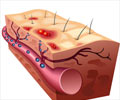Q: Which doctor should I consult for postherpetic neuralgia?
A: You must consult a neurologist for treatment of postherpetic neuralgia.
Q: Does the pain stop with the medications?
A: Many patients do get pain relief with medications. One medication can be substituted for another if the patient fails to respond. In some cases, combinations of medications are also used. Unfortunately, there are still some people who do not respond to medications. Surgical treatment is used as the last option.
Q: Is postherpetic neuralgia in any way related to oral herpes infection?
A: No. Oral and genital herpes are caused by the herpes simplex virus while shingles is caused by the varicella zoster virus, the virus that causes chicken pox. 4. What is the difference between acute herpetic neuralgia and postherpetic neuralgia? Acute herpetic neuralgia refers to pain associated with herpes zoster that lasts for up to a maximum of 1 month following the rash. The pain in postherpetic neuralgia lasts for a minimum of 3 months following recovery from the rash. Neuralgia that lasts between 1 to 3 months following the rash is referred to as subacute herpetic neuralgia. 5. Do all people with shingles develop postherpetic neuralgia? No. Postherpetic neuralgia affects between 10-30% of people who develop shingles. It is more common in older individuals.
Q: What is the difference between acute herpetic neuralgia and postherpetic neuralgia?
A: Acute herpetic neuralgia refers to pain associated with herpes zoster that lasts for up to a maximum of 1 month following the rash. The pain in postherpetic neuralgia lasts for a minimum of 3 months following recovery from the rash. Neuralgia that lasts between 1 and 3 months following the rash is referred to as subacute herpetic neuralgia.
Q: Do all people with shingles develop postherpetic neuralgia?
A: No. Postherpetic neuralgia affects between 10% and 30% of people who develop shingles. It is more common in older individuals.







